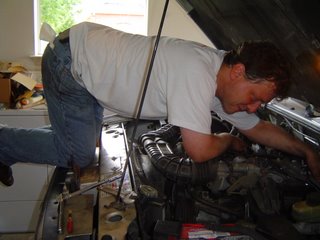So at work today I had to listen to some customer bitch and moan about gas prices, about how they're going to hit 5 a gallon, etc, etc, etc. Everyone seems to have this attitude that if situations change
in any way from the way things are now, that it's a BAD THING. CHANGE IS BAD. The funny thing is, what's so great about the way things are now? As a country we're overweight, overworked, overstressed, and we spend more than an hour a day (average) commuting to and from work. What would happen if gas got so expensive that we couldn't afford to buy it willy-nilly anymore? Maybe we would have to walk some places instead. Maybe, as a country, we could shed a few pounds from the walking and lose the embarrasing moniker of "world's fattest country." Maybe walking more and losing weight would relieve some of that stress, the stress that creates everything from heatburn/ulcers, to back pain, to heart issues, to . . . weight gain. Especially if, say, we were commuting less; after all those 50/60/80 hour weeks are only compounded by the hellish drive to and fro. Cars are expensive and require insurance, maintenance and fuel. If some of us let them go entirely, a major expense would dissapear from our debit columns. We could work a little less or (more likely) spend the money on something funner, or even reverse the negative-savings trend that keeps people from falling asleep at night. If enough of us could stop driving, maybe we could reduce the smoggy pollution that is destroying the environment, the ozone layer, and our health.
I know what you're thinking... you're thinking, "There's no way in hell I could walk to work, or to anywhere else for that matter! My work is 20 miles away! There's nothing around my house for miles exept other houses... no corner stores, restaurants, libraries or post offices are within walking distance from my home."
Ever since the end of World War II (that's the second one), our cities have been designed on the principle that families have cars, can afford houses, and would prefer to live in the suburbs. Unfortunately this has not proved paticularly true; it just served to separate the haves and have-not-quite-yets by miles instead of blocks. As for the happiness, the suburbs created in one short decade that whole "feminine ennui" thing that's kept women's study authors and novelists busy for decades (you know, when they discovered that there is more to fufillment than a new washer-dryer combo and self-defrosting fridge), and... the
teenager, that creature of the suburbs filled with angst and rage and boredom. Lack of true community= major disenchantment. Sleeper cities are no more community than my apartment complex is... we all drive away in the morning, and come home to walk our dogs and sleep. I'm actually convinced that anyone who really
likes the suburbs just hasn't had the opportunity to live many other places.
What if, due to the unavailability of fuel, we had to start redesigning our habitats so that we lived and worked in tandem, so that work wasn't more than a short distance from home? This is more possible than ever due to the fact that our jobs are more and more "white collar"; living near office buildings and retail shops is a bit more desireable than, say, a smelting plant. Trust me; my mom grew up right next to some smelting plants. Or something like that. They belched black smoke and looked like something out of
Ferngully-- the bad bits. When I get to visit the old, nasty parts of Detroit I totally understand why the suburbs were invented in the first place. But the majority of us don't smelt. It's not like this would require major legislation; people move to places--and take jobs-- in places they'd like to live. A company has an easier time staffing if it locates in an area with a good cost of living, a great climate, lifestyle accoutrements (nightlife, skiing, museums, whatever); an easy, walkable or bikeable commute could become just one more desireable asset to a community.
It's not that cars are evil, or that we shouldn't ever drive anywhere. This is, after all, a country just asking to be explored by vehicle. But maybe a change in the way we live wouldn't be the worst thing in the world. It would certainly be better than scrambling to maintain the status quo: going to war for oil so that we can each drive an SUV, drain our final reserves (destroying everything from fragile tundra to fragile wetlands) so that macho guys can drive their pick-up trucks (just to work and back, they wouldn't want to get the truck-bed dirty), and subsidizing fuel so that every family with one or two kids can maintain their fleet of minivans. All that just to maintain our status as overweight stessed out overworked unhealthy Americans with video players in the back seat.
 Don: Nah, it's actually kind of like that Upside-down Dog thing you were showing me ...
Don: Nah, it's actually kind of like that Upside-down Dog thing you were showing me ... 